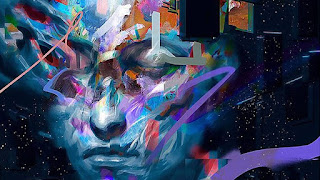Metaphysical Metaphors: Techgnosis and Ecognosis
Gnosis is the common Greek noun for knowledge. It is best known from Gnosticism, where it signifies a knowledge or insight into humanity’s real being as cosmic, leading to the deliverance of the divine spark within humanity from the constraints of plain existence. The Gnostics considered the most essential part of the process of salvation to be this personal knowledge.
Gnosis is knowledge of the cosmos. Techgnosis and ecognosis reflect knowledge of the realm of technology and the realm of earth. Techgnosis frames existence as a machine-like metaphor. Ecognosis frames existence as an organism-like metaphor. Each offers a greater insight into metaphysical reality. It is by way of Gnosis however that we leave behind any notion of materiality. Through Gnosis we are not linked with either the machine-like or the organism-like metaphors. Instead we transcend these metaphors by way of Gnosis of the Cosmos. Metaphysical metaphors of supermachine and superorganism will not suffice. The supermind is the mediator between these two composites- in other words Cosmic Consciousness.
This metaphor is known as panpsychism or animism. In philosophy, animism is the conception that objects, places and all entities possess a distinct spiritual essence. Potentially, animism perceives all things—animals, plants, rocks, rivers, weather systems, technology, human handiwork and perhaps even words—as animated and alive. All are animated by the thoughts of a Cosmic Consciousness. In philosophy, panpsychism is the view that mind or a mind-like aspect is a fundamental and ubiquitous feature of reality. It has taken on a wide variety of forms. Contemporary academic proponents hold that sentience or subjective experience is ubiquitous, while distancing these qualities from complex human mental attributes. On the other hand, some historical theorists ascribed attributes like life or spirits to all entities. Panpsychism is one of the oldest philosophical theories, and has been ascribed to philosophers including William James.
As for techgnosis, the older doctrine, here called universal mechanism, is the ancient philosophies closely linked with materialism and reductionism, especially that of the atomists and to a large extent, stoic physics. They held that the universe is reducible to completely mechanical principles—that is, the motion and collision of matter. Later mechanists believed the achievements of the scientific revolution had shown that all phenomena could eventually be explained in terms of 'mechanical' laws, natural laws governing the motion and collision of matter that implied a thorough going determinism: if all phenomena could be explained entirely through the motion of matter under the laws of classical physics, then even more surely than the gears of a clock determine that it must strike 2:00 an hour after striking 1:00, all phenomena must be completely determined: whether past, present or future.
Erik Davis argues in his book TechGnosis that for many Internet users there’s a spiritual component to their links with it, and that valid comparisons can be made with earlier technological developments that also became metaphors for our view of the world. He cites the example of the Extropians, a Californian sect which believes it may one day be possible to download the essence of the human mind into a computer and so achieve immortality, and suggests this has elements in common with the Christian belief in the afterlife.
Davis argues this spiritual feeling is a high-tech update of gnosis, an early Christian belief, hence his title and the word techgnosis for its modern equivalent. Technology is not some neutral tool that we create, but rather a force as strange and difficult to comprehend as humans themselves.
As for ecognosis, organicism is the philosophical perspective which views the universe and its parts as an organic whole and, by analogy or literally, as a living organism. It is thus a form of holism. Organicism is an important tradition within the history of natural philosophy. Plato is among the earliest philosophers to have regarded the universe as an intelligent living being.
Organicism flourished for a period during the era of German romanticism during which time the new science of biology was first defined by Jean-Baptiste Lamarck. Within modern-day biological sciences organicism is the approach that stresses the organization (particularly the self-organizing properties), rather than the composition, of organisms.
Ecological awareness in the present Anthropocene era takes the form of a strange loop or Möbius strip, twisted to have only one side. Ecological awareness takes this shape because ecological phenomena have a loop form that is also fundamental to the structure of how things are.
The logistics of agricultural society resulted in global warming and hardwired dangerous ideas about life-forms into the human mind. Ecognosis puts us in an uncanny position of radical self-knowledge, illuminating our place in the biosphere and our belonging to a species in a sense that is far less obvious than we like to think. Ecognosis explores the logical foundations of the ecological crisis, which is suffused with the melancholy and negativity of coexistence yet evolving, as we explore its loop form, into something playful, anarchic, and comedic.
“Becoming a geophysical force on a planetary scale,” writes Timothy Morton in Dark Ecology, “means that no matter what you think about it, no matter whether you are aware of it or not, there you are, being that.” This is the state of affairs of the Anthropocene, where ecological awareness, what Morton calls “ecognosis,” implicates us all in some sort of environmental film noir: just as the detective is also the criminal, the philosopher is part of the massively distributed thing that is the human species and contributes to mass extinction. The darkness of noir is precisely the state in which Morton wants philosophy to remain because, as Morton writes, we “live inside a philosophy alongside worms, bees, plows, cats, and stagnant pools” but to which philosophy remains suspiciously “silent.”
Morton argues across three threads in Dark Ecology that philosophy is hamstrung because human thought has become entwined in the looping structure of what the book calls “agrilogistics,” a logic dating back to Mesopotamian agriculture that is responsible for how humans and megacorporations still think of nature as an easy-think substance and which remains the main obstacle for humanity to comprehend its part in global warming.




Comments
Post a Comment